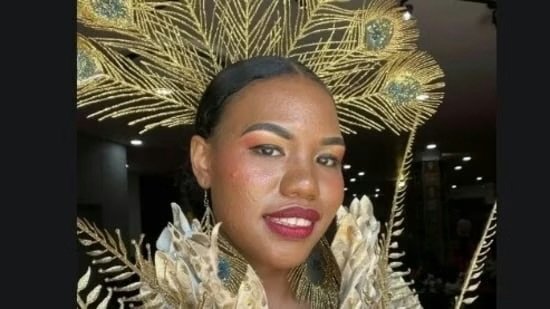In a controversy that has sparked national debate and international attention, Merince Kogoya, a contestant in the Miss Indonesia pageant, has been disqualified following the resurfacing of a video showing her dancing and waving an Israeli flag. The video, reportedly recorded while she was studying abroad, featured a caption that read, “Diligent for Sion, loyal to Jerusalem, standing for Israel,” which quickly became the center of a political and religious firestorm in Indonesia, the world’s largest Muslim-majority country.
The Video That Sparked a Firestorm
The clip, which surfaced on social media, shows Kogoya waving the Israeli flag in what appears to be a Christian religious context. The action immediately ignited public outrage, given Indonesia’s staunch support for Palestine and lack of diplomatic ties with Israel. While the video may have been personal in intent, its political implications were impossible to ignore in a nation deeply invested in the ongoing Israel-Palestine conflict.
Social media users swiftly reacted, accusing Kogoya of lacking empathy, being politically insensitive, and disregarding the broader historical and humanitarian context of the Middle East crisis. Her actions were interpreted by many as support for a nation embroiled in a violent conflict, where over 56,000 Palestinians have been killed in Gaza as of recent reports from the local health ministry.
Disqualification Without Explanation
In the days following the backlash, the Miss Indonesia Organization discreetly removed Kogoya from the official contestant lineup. As reported by The Jakarta Globe, she was replaced by Karmen Anastasya, the first runner-up from her province. However, the organization has yet to issue an official public statement regarding Kogoya’s disqualification or the decision-making process behind it.
The silence has only fueled more speculation and debate online, with critics demanding transparency, while others argue that the organization was right to take quiet action in order to protect the pageant’s reputation and national sentiment.
Netizens Weigh In: Polarized Opinions
The controversy quickly exploded across platforms like X (formerly Twitter), where users didn’t hold back in voicing their frustration:
“By considering the genocide committed by Israel as merely a religious conflict, she has already shown she doesn’t meet the bare minimum for Miss Indonesia, who must have broad knowledge. No morals or empathy.”
Another user offered a sharply contrasting view:
“What kind of competition is this? A competition to be supporters of the TERRORIST Hamas? So dumb.”
This deep polarization highlights the complexity of the issue, revealing how global politics, personal faith, and national identity are often difficult to separate — especially in high-profile competitions like Miss Indonesia.
Merince Kogoya Responds: “It Was Not Political”
Amid the online storm, Kogoya issued a brief response via Instagram Story, attempting to clarify the intent behind the video. She wrote:
“I was simply practicing my faith as a follower of Christ by praying and offering blessings, but an old video from my reels went viral with many false interpretations about my beliefs.”
Kogoya maintained that the video was a reflection of her Christian identity, not a political endorsement. However, critics pointed out that her Instagram bio still included the phrase “I stand with Israel”, reinforcing the belief that her stance was not just religious, but politically symbolic.
Indonesia’s Official Position on Israel-Palestine
Indonesia has long been an unwavering supporter of the Palestinian cause and has no formal diplomatic ties with Israel. In May 2024, President Prabowo Subianto reiterated that Indonesia would only consider normalizing relations with Israel if it officially recognizes the state of Palestine. The statement reflects the broader sentiment across the nation, where support for Palestine is not only a political stance but also a cultural and religious imperative.
Given this context, any public expression of solidarity with Israel — even from a personal religious standpoint — is bound to ignite backlash in Indonesia, especially when made by someone in a high-visibility role like a national pageant contestant.
A Complex Intersection of Faith, Identity, and Politics
The Kogoya controversy underscores a larger issue faced by public figures in today’s hyper-connected, politically sensitive world — the inescapable weight of their personal beliefs and actions. While Kogoya may have intended to express her religious identity, the act of publicly waving the Israeli flag in the midst of one of the deadliest conflicts in modern times was perceived by many as deeply insensitive and politically charged.
In global pageants, where contestants are often seen as ambassadors of national values and unity, such actions carry consequences. The incident serves as a stark reminder that in representing a country on any platform — especially one as emotionally invested as Indonesia — every gesture is scrutinized for deeper meaning.
Where Do We Go From Here?
As the Miss Indonesia organization remains silent, and public sentiment continues to shift, the Kogoya episode will likely influence how future contestants are vetted — not just for beauty and talent, but for awareness, cultural sensitivity, and political neutrality.
It also reignites discussions around religious freedom versus national sentiment, and whether individuals can express their personal faith without being viewed as making political statements — especially in countries where religion and geopolitics are deeply intertwined.
For now, Merince Kogoya’s journey in Miss Indonesia has ended — but the conversation her video sparked is far from over.






